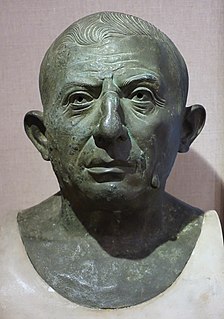This article concerns the period 139 BC – 130 BC.
Publius Cornelius Scipio Nasica Serapio was an important politician of the Roman Republic. A member of the great patrician gens Cornelia, he was the son of Scipio Nasica Corculum, the pontifex maximus and princeps senatus. As with many other Cornelii Scipiones, Serapio obtained several prominent offices; he notably succeeded his father as pontifex maximus in 141 BC, and became consul in 138 BC. A firm conservative, like his father and his cousin Scipio Aemilianus, he led the opposition to the tribune of the plebs Tiberius Gracchus, whom he finally murdered in 133 BC. However, he was sent to Asia by the senate to avoid his prosecution by Gracchus' supporters, and died in Pergamon soon after.

The Caecilii Metelli, one of the most important and wealthy families in the Roman Republic, came of noble stock. The Caecilii Metelli, part of the gens Caecilia, remained a political power within the state from the 3rd century BC to the end of the Republic in the 1st century BC, holding every office in the cursus honorum as well as several important military commands.
Quintus Caecilius Metellus Macedonicus was a Praetor in 148 BC, Consul in 143 BC, Proconsul of Hispania Citerior in 142 BC and Censor in 131 BC.

Quintus Caecilius Metellus Pius was a Roman politician and general. Like the other members of the influential Caecilii Metelli family, he was a leader of the Optimates, the conservative faction opposed to the Populares during the last century of the Roman Republic.
Publius Licinius Crassus Dives Mucianus was the natural son of Publius Mucius Scaevola and Licinia, and brother of Publius Mucius Scaevola. He was adopted at an unknown date by Publius Licinius Crassus, his mother's brother, or by a son of the consul of 205 BC, Publius Licinus Crassus Dives.

The gens Cornelia was one of the greatest patrician houses at Rome. For more than seven hundred years, from the early decades of the Republic to the third century AD, the Cornelii produced more eminent statesmen and generals than any other gens. At least seventy-five consuls under the Republic were members of this family, beginning with Servius Cornelius Maluginensis in 485 BC. Together with the Aemilii, Claudii, Fabii, Manlii, and Valerii, the Cornelii were almost certainly numbered among the gentes maiores, the most important and powerful families of Rome, who for centuries dominated the Republican magistracies. All of the major branches of the Cornelian gens were patrician, but there were also plebeian Cornelii, at least some of whom were descended from freedmen.
Publius Licinius Crassus Dives Pontifex Maximus was consul in 205 BC with Publius Cornelius Scipio Africanus ; he was also Pontifex Maximus since 213 or 212 BC, and held several other important positions. Licinius Crassus is mentioned several times in Livy's Histories. He is first mentioned in connection with his surprising election as Pontifex Maximus, and then several times since in various other capacities.
Licinia is the name used by ancient Roman women of the gens Licinia, including
Scipio is a Roman cognomen representing the Cornelii Scipiones, a branch of the Cornelii family. Any individual male of the branch must be named Cornelius Scipio and a female Cornelia. The nomen, Cornelius, signifies that the person belongs to the Cornelia gens, a legally defined clan composed of many familiae. The cognomen, Scipio, identifies the line, or branch within the clan. Other branches had other cognomina; during the Republic there were no Cornelii who did not belong to some branch of the ancient clan. As branches developed, each was identified by its own agnomen, such as Africanus. The formal names of the Cornelii were thus at least two names long; in the late Republic, three or more.
Gaius Caecilius Metellus Caprarius was a consul of the Roman Republic in 113 BC with Gnaeus Papirius Carbo. He served under Scipio Aemilianus in Numantia around 133 BC. He was praetor in 117 BC. His proconsulship in Thrace in 112–111 BC earned him a triumph. He was censor in 102 BC with his cousin, Quintus Caecilius Metellus Numidicus.

Quintus Caecilius Metellus Pius (Cornelianus) Scipio Nasica, in modern scholarship often referred to as Metellus Scipio, was a Roman consul and military commander in the Late Republic. During the civil war between Julius Caesar and the senatorial faction led by Pompeius Magnus, he remained a staunch optimate. He led troops against Caesar's forces, mainly in the battles of Pharsalus and Thapsus, where he was defeated. He later committed suicide. Ronald Syme called him "the last Scipio of any consequence in Roman history."
Publius Cornelius Scipio Nasica was a politician of the Roman Republic. He belonged to the great patrician family of the Cornelii Scipiones, and was the son of the pontifex maximus Nasica Serapio, who famously murdered Tiberius Gracchus in 133 BC. Nasica was on track to a prestigious career like most of his ancestors, being praetor in 118 BC, but he died during his consulship in 111 BC.

The gens Caecilia was a plebeian family at Rome. Members of this gens are mentioned in history as early as the fifth century BC, but the first of the Caecilii who obtained the consulship was Lucius Caecilius Metellus Denter, in 284 BC.

Publius Cornelius Scipio Africanus, also known as Scipio Africanus Major, Scipio Africanus the Elder, and Scipio the Great, was a Roman general and later consul who is often regarded as one of the greatest military commanders and strategists of all time. His main achievements were during the Second Punic War. He is best known for defeating Hannibal at the final Battle of Zama in 202 BC. The victory was one of the feats that earned him the agnomen Africanus.





